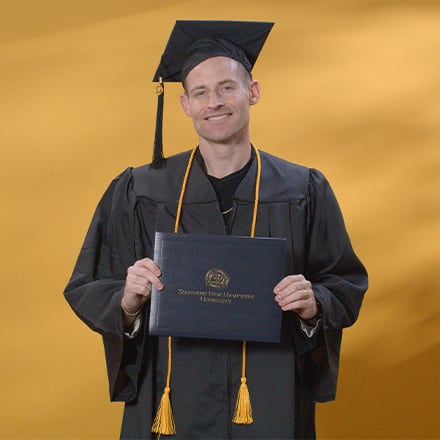Navy Veteran Pursues Her BSN - And Her Brother is the Reason Why

Mayra Lizeth Fujiwara, RN has many names.
Her kids call her Mom. Her patients call her “nurse.” In the military, service members called her Chief, sometimes Sparky — a term of endearment for U.S. Navy electricians. “Most people just call me Liz,” she said.
But as she blazes through her Bachelor of Science in Nursing (BSN) at Southern New Hampshire University (SNHU) with an unwavering 4.0, her academic advisor Hannah Byrne calls her an inspiration. "I know she is destined for great things," Byrne said.
For someone who wears lots of hats, Fujiwara is incredibly steady. She speaks about each part of her life with equal passion and energy. She’s the type of student who knows what it means to balance school, work and family — all while finding time for camping in her RV on the weekends.
But how did she get here, four short classes away from graduating with her degree in nursing? And why did she choose to pursue it in the first place?
Her story begins with her brother.
A Protective Sister Joins the Navy
 For as long as she can remember, Fujiwara felt called to a career in healthcare. “I just knew,” she said.
For as long as she can remember, Fujiwara felt called to a career in healthcare. “I just knew,” she said.
This ambition only strengthened when her brother graduated from high school and became a Marine. Overcome by a desire to protect him, she vowed at that moment to become a nurse. “I later discovered that the U.S. Marines did not have nurses, but received medical care from the Navy,” she said. “So, I enlisted with them.”
As it turned out, the Navy didn’t need nurses when she enlisted — they needed electricians, so that’s what Fujiwara became first. As an Electrician’s Mate (EM) with a rank of E-7, Chief Petty Officer, she spent much of the next eight years at sea on the USS Carney.
Her time in the Navy gave her a sense of purpose, an understanding of hard work and an appreciation for every person’s individual value. “Everyone is essential, regardless of rank or job,” Fujiwara said. “We all depend on each other.”
The Road to RN
But even amidst a successful naval career, nursing remained Fujiwara’s goal — and her brother remained her inspiration.
“He made me promise to try and get a degree,” she said. So she did just that. Using military benefits she’d earned through service, she completed her associate degree in May of 2020.
Shortly after, she passed the National Council Licensure Examination (NCLEX) and started her first nursing job working nights a month later — no small feat in the tumultuous early days of the pandemic. At the time, Fujiwara was still on active duty during the day, balancing a new nursing career with her responsibilities to the Navy.
Nurse by Day, Student by Night
After completing her military service in 2021 and transitioning to a day position with Sentara Healthcare, Fujiwara enrolled in the BSN program at SNHU. Now, she spends her days caring for patients as a full-time bedside nurse, is the president of her hospital's medical/surgical council, serves as a preceptor for new nurses and works as an ambassador for new hires.
On a typical day, this involves completing nursing assessments and lab work, communicating with the interdisciplinary team and coordinating patient care. It’s not uncommon for shifts to be 12 hours long.
At night, she studies.
“Obtaining my BSN will open many opportunities to further my nursing career,” she said. “I would either like to grow into a leadership position or commission in the U.S. Navy Nurse Corps.”
 Her dream job? Working as a flight nurse. “They have my deepest respect,” she said.
Her dream job? Working as a flight nurse. “They have my deepest respect,” she said.
According to Fujiwara, what really lights her up and keeps her going, more than anything, is her family.
“My husband has been with me 100% of the way,” she said. “He is still on active duty, so sometimes he provides moral support from afar.”
Her kids play a big role in driving her, too. “My son and daughter motivate me,” she said. Her daughter is 12, and the two of them enjoy studying together after they eat dinner as a family. Fujiwara said this time together is often the highlight of her day.
Education for an Evolving Field
As she nears the finish line for her BSN, Fujiwara reflected on why this degree matters so much to her.
In many ways, it comes back to family. Her brother was her first motivator, the catalyst for her entire nursing career. Now, it’s about her kids, who have watched her journey unfold and look to her as a role model.
“My children have learned to work hard for their achievements,” she said. “My husband and I lead by example, and our children carry those values everywhere they go.”
But in some ways, Fujiwara has become her own motivator, too. This degree is important to her not only for its emotional significance, but for the tools it will provide her in her career.
“Education is the basis for nursing,” she said. “Nursing is an ever-changing profession and is always evolving. We need to be up-to-date on the latest evidence-based practices.”
Fujiwara is scheduled to graduate from SNHU with her BSN this August. Her journey leading up to this milestone has spanned naval ships, hospital rooms and virtual classrooms. And according to her academic advisor, this next leg will no doubt be marked by a continued pursuit of her goals.
"She has always known what she wants and has taken every step to achieve it," Byrne said.
A degree can change your life. Find the SNHU nursing program that can best help you meet your goals.
Abigail Mark ’23G is a writer at Southern New Hampshire University. Connect with her on LinkedIn.
Explore more content like this article

The Importance of Health Education

SNHU Spotlight: Philip Hensarling, BS in Healthcare Administration Grad

SNHU Spotlight: AnnMarie Kulis, MS in Healthcare Administration Grad
About Southern New Hampshire University

SNHU is a nonprofit, accredited university with a mission to make high-quality education more accessible and affordable for everyone.
Founded in 1932, and online since 1995, we’ve helped countless students reach their goals with flexible, career-focused programs. Our 300-acre campus in Manchester, NH is home to over 3,000 students, and we serve over 135,000 students online. Visit our about SNHU page to learn more about our mission, accreditations, leadership team, national recognitions and awards.

